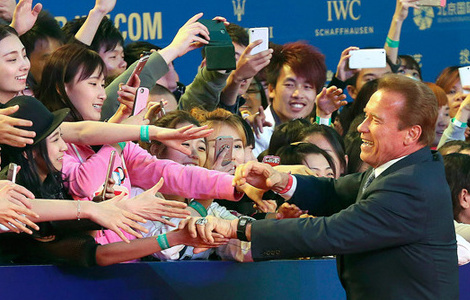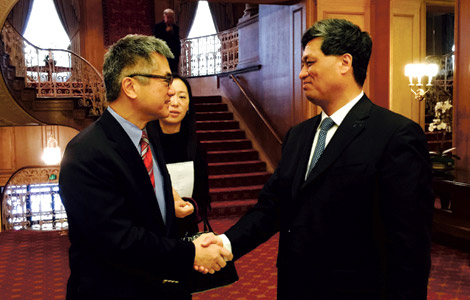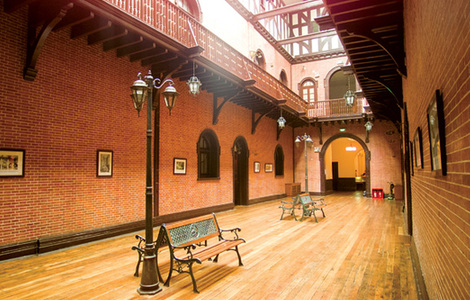Ecuador scraps visa to woo Chinese tourists
Updated: 2015-04-20 03:30
By Li Jing in Beijing(China Daily Latin America)
|
||||||||
 |
|
At the China Outbound Travel and Tourism Market in Beijing, Maria Cristina Rivadeneira, Ecuador's deputy minister of tourism, said Ecuador is expected to triple arrivals from China in 2015.[Photo provided to China Daily] |
Tourists from China will soon no longer need a visa to visit Ecuador, as the Latin American country looks to triple the number of Chinese sightseers by the end of this year.
The move comes after Chinese President Xi Jinping and Ecuadorean President Rafael Correa agreed in January to mutually abolish tourist visas.
"The elimination of visas for Chinese visitors will happen in less than two months," Maria Cristina Rivadeneira, Ecuador's deputy minister of tourism, said on April 15 at the China Outbound Travel and Tourism Market, in Beijing. "China is our target market this year and we plan to attract 55,000 travelers from China."
According to ministry's data, last year the South American country received 17,000 Chinese tourists, a 13 percent increase compared with 2013.
Ecuador is betting on its highly diverse culture and landscapes to lure Chinese travelers, as well as its wildlife, especially on its Galapagos Islands, which was where biologist Charles Darwin drew much inspiration for his masterpiece, The Origin of Species.
"We have coastal landscapes, volcanoes, the Amazon rainforest and Andean highlands — all in one place," said Cristina Rivadeneira. "And the small size of the country makes every attraction easy to access."
In China, the country's brand slogan is, "All you need is Ecuador."
Ecuador gets its name from the Spanish word for equator, which runs through it, and is the fourth-smallest country in South America.
So far, the county has not been a major destination for Chinese tourists, largely due to the distance. There are no direct flights between the two countries, which means a stopover in either Europe or the United States. Combined, the travel time is at least 21 hours.
Ecuador President Rafael Correa said during his visit to China in January that he hopes a direct flight from Quito, the capital, to Beijing will start soon after visa procedures are simplified. After that, he said, he expects the number of Chinese tourists coming to Ecuador to increase to "150,000 in a few years".
Cristina Rivadeneira said most visitors from China are on group tours. "They are usually older 50 and just stopover in Ecuador on trips around South America," she said, adding that March and July is the peak season. She predicted that family tours and fly-drive packages will become more popular in the near future.
The dip in oil prices, which resulted in the Ecuadorian government cutting its 2015 budget by 4 percent, has prompted the country to try and diversify its energy-reliant economy, with tourism now a top priority.
China, as the world's largest outbound tourism market and largest spender on outbound tourism, is an important market for Ecuador. The country has set up a tourism office in Beijing and plans to launch a Chinese-language tourism website.
"We are also facilitating services for Chinese tourists," the deputy tourism minister said. "For example, tourists arriving at Ecuador will get maps in Chinese. We're also training tourism operators in Chinese, as well as workers at hotels and stores."
In April, the Galapagos Islands were listed as the best destination for diving by Chinese tourists in a poll carried out by Qyer, a travel website, and the Chinese National Geography magazine.
Jose Maria Borja, Ecuador's ambassador to China, said he hopes his country can attract more Chinese, but added that people looking to visit for the purposes of trade or education will still need a visa.
The bilateral ties between China and Ecuador have been enhanced in recent years along with the cooperation in a number of large projects. On April 7, The Chinese Sinohydro Corporation completed the stage of conduction of the Coca Codo Sinclair hydroelectric project, the biggest hydroelectric power station in Ecuador.
lijing2009@chinadaily.com.cn

 Natural History Museum opens in Shanghai
Natural History Museum opens in Shanghai
 Japanese WWII surrender video debuted at China museum
Japanese WWII surrender video debuted at China museum
 Beijing film festival draws top moviemakers, Oscar winners
Beijing film festival draws top moviemakers, Oscar winners
 Across America over the week (from April 10 to 16)
Across America over the week (from April 10 to 16)
 Historic hotels offer more than a view
Historic hotels offer more than a view
 Top 10 foreign holders of US Treasuries
Top 10 foreign holders of US Treasuries
 Lost in sandstorms
Lost in sandstorms
 New roles for technology: Rise of robots
New roles for technology: Rise of robots
Most Viewed
Editor's Picks

|

|

|

|

|

|
Today's Top News
Central bank lowers reserve ratio
Envoy sees many benefits from Xi's Pakistan visit
China concerned at reports of New Zealand-US plan to spy on diplomats
Old Summer Palace may sue over controversial replica
China and the 2016
US election
World Bank, IMF: will work
with AIIB
Ex-PM says US, China can be allies
Hainan Air links San Jose, Beijing
US Weekly

|

|






